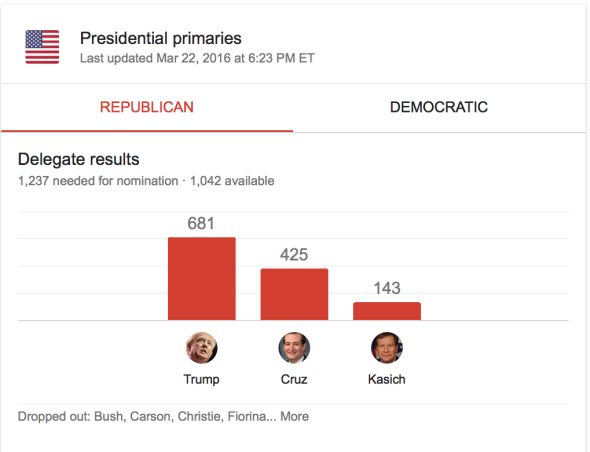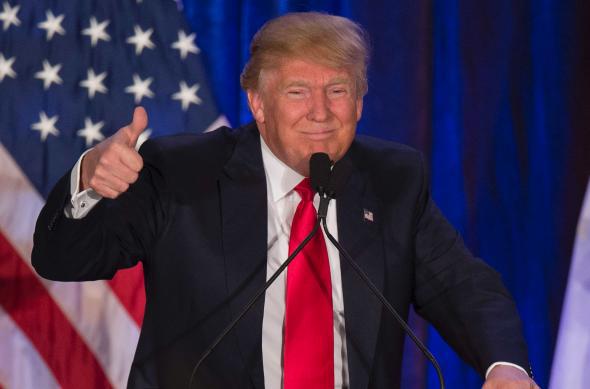Update, Wednesday, 5:55 a.m.: Ted Cruz won in Utah. With 85 percent reporting, the Texan is way out in front with nearly 70 percent of the vote, while Kasich and Trump are stuck in the teens. Cruz’s margin of victory is particularly important since, under Utah GOP rules, a candidate who wins a majority of the statewide vote wins all of the state’s 40 delegates.
Update, Tuesday, 11:20 p.m.: Donald Trump wins Arizona.
Update, Tuesday, 9:35 p.m.: Can winner-take-all in Utah jumpstart Cruz? (via the New York Times)
The most significant question looming over Tuesday’s contests is whether Senator Ted Cruz of Texas can exceed 50 percent of the vote in Utah. If so, he would take all 40 of the state’s delegates and mitigate Donald J. Trump’s expected victory in Arizona, a state that allocates all 58 of its delegates to the top vote-getter.
Original Post: The last time Republican voters went to the polls they had more choices. On Tuesday, as GOP voters head into the voting booth in Arizona and to caucus in Utah, the general dynamics of the Rubio-less race remain largely unchanged. After a dismal showing last Tuesday in key GOP battlegrounds, particularly his home state of Florida, Marco Rubio followed Ben Carson’s example and headed for the exits. Unlike Carson, who wasted little time falling in line with Trump, Rubio has not and seems unlikely to align himself with his chief tormentor. The big question that awaits Tuesday night is: Which candidate will Rubio supporters turn to?
Sure, Rubio’s support was in deep decline by the time he pulled out of the race, but even with diminished backing, the Florida senator commanded enough votes that if added to Cruz’s vote totals in last week’s voting—in Illinois, North Carolina, Missouri, and Florida—it would have been enough to catapult Cruz over Trump in each of the five states the Donald won. Will that happen? Ohio Gov. John Kasich has managed to smile his way back into the discussion, if not exactly the delegate race itself, with his victory in his home state of Ohio, and he seems poised to take a chunk of disaffected Rubio supporters that are neither anti-establishment nor able to stomach Cruz.

Google/AP
Will it matter? Trump is already halfway home in the delegate race, and while Cruz likes to talk about his path to the nomination, it would take a major stumble by Trump or significant event to flip the current delegate count on its head.
The most recent debate was canceled after Trump pulled out, so there are no new sound bites to add to the mix this time around. The deadly bombings in Brussels on Tuesday are the sort of event that could shake up a race for president. Despite his lack of foreign policy chops, however, Trump’s lurching, incendiary statements in the aftermath of tragedy, no matter how naïve and misguided, have actually fueled his rise. See Trump’s proposed ban on Muslims coming to the U.S. post-Paris attacks. That leaves Cruz needing to make a splash to change the race sooner rather than later if he has any chance, no matter how slim, to derail Trump. And then there’s always the looming possibility of the—duh duh dum—brokered convention. What exactly a brokered convention would mean remains unclear, but here are the broad outlines of how it would work.
Heading into Tuesday’s votes, Trump held a double-digit lead in Arizona polls, averaging a 13-point gap over Cruz in surveys taken this month. In Utah, the outlook looks brighter for the anti-Trump contingent with both Cruz and Kasich polling ahead of the Republican front-runner by a significant margin. Cruz has done particularly well in conservative caucus states in the past, so a third place Trump showing wouldn’t be a surprise.
